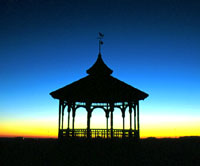
 |
|
What
Makes Martha's Vineyard Unique? A Man like John Wesley Mayhew Whiting Obituary - By Sam Low The professor reached beneath the pond's surface and hauled up a grid of PVC tubes designed to float at a certain height and attract the tiny fry - establishing a kind of low-income oyster housing project. He was not a marine biologist, but rather an anthropologist - a world authority on childrearing practices. He was, of course, John Wesley Mayhew Whiting, whose death on May 13th is a blow to both the oysters of Tisbury Great Pond and to all of us who have encountered him either on some island Main Street or in the groves of academe. I chose John Whiting as my thesis advisor because my project, a study of squatter housing in Peru, was somewhat of a maverick one at Harvard - that is to say, it did not further the research aims of any of the faculty there. One prestigious pedagogue advised that I do what he called a "quick and dirty" thesis, a research project that would be simple and easy to finish (he had one in mind that fit perfectly into his own research needs), but John Whiting supported going out on my own intellectual limb. I don't remember what he said exactly but it was certainly something like "follow your passion." As near as I can figure out, following a passion is exactly what John Whiting and his wife Beatrice (we knew her as Bea at Harvard) did throughout their life. As a teenager, I remember seeing my first windmill at the Whiting's Quansoo cottage. Connected to a bank of batteries in an outbuilding, it provided electric current to a number of small lights, like a yacht's, to illuminate their simple camp. The Whitings raised sheep, they farmed their land, they fished the waters of the Great Pond and gathered shellfish there. They also established an informal academic hothouse - inviting prestigious scholars the world over to spend time with them at Quansoo. At Harvard, in those days - the sixties - still somewhat a stuffy holdout of academic privilege, John eschewed the title of "professor" or "doctor." He preferred to be addressed simply as "John." His face expressed well his inner being. His ears were swept back, suggesting constant motion. Ripples of laughter seemed to radiate away from the corners of his mouth. His eyes, alit behind glasses, were ridged at the edges by squinting, I suppose, into so many dawns either in Kenya (where he did much of his anthropological field work) or at the Great Pond. Although he was a large man he was in no way corpulent. His body always presented the grace and power of a wrestler, which is what he was in earlier years. In small intimate Harvard seminars he cultivated curiosity, seeking always the right question as opposed to the right answer. This year, In June, I will move to the Vineyard permanently, lured partly by the promise of visiting with John from time to time. I am sad that this will not now be possible. For me, John Wesley Mayhew Whiting represents an answer to a question that I grapple with as I read accounts in the Gazette of new developments and amenities, and the friction they are generating throughout the island. The question - "what kind of life experience makes Martha's Vineyard unique?" - would perhaps delight John. And surely the way that he lived his life is one example of the answer. |
Sam Low.com home | Biography | Library | Gallery | Screening Room | Forbears | Notebook | Contact Sam
Site, text, and images Copyright © 2002 Sam Low. All rights reserved. Any or all content may not be used without Sam's permission.